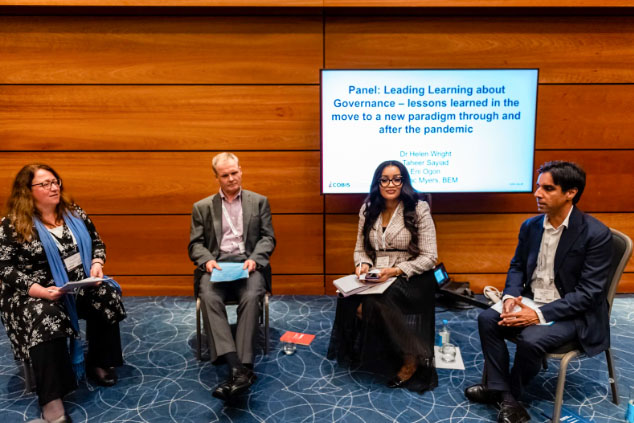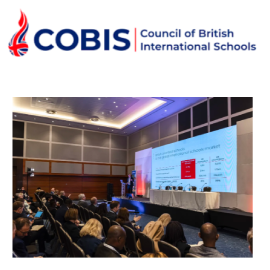Reflections from the COBIS Conference 2023

Two weeks ago, Mr Morgan, Taheer Saiyad (Parent and Board Member) and Ms Dore (Deputy Principal and Director of Professional Learning and Growth) attended the COBIS Annual Conference in London. COBIS is the Council of British International Schools. It has over 250 of the best British international schools around the world in 76 different countries.

The conference theme was “Leading Learning for a New Paradigm." The event started with Lord Jim Knight, the incoming COBIS Chair, delivering a speech titled "Empowering Students for their Future" and moderating a panel discussion featuring students from COBIS schools. Charles Fadel, from the Centre for Curriculum Redesign, presented on "Education for the 21st Century in an Age of A.I." Meanwhile, Matthew Savage chaired a panel focusing on "Positive Strategies to Support Student Mental Health and Wellbeing."
On the second day, Frank Gardner, the BBC Security Correspondent, captivated the audience with his talk on "Turning Adversity to Your Advantage." Angela Browne shared insights on "New Paradigm Approaches to Diversity Equity and Inclusion." Finally, the conference concluded with an interactive session on "Redesigning International Education," facilitated by Priya Lakhani from CENTURY and Kai Vacher from the British School Muscat. Taheer also participated in a panel on the topic of governance in schools.
Additionally, delegates had the opportunity to participate in over 20 breakout sessions led by a diverse range of speakers and facilitators.
Disruption is coming to the world and to schools. In some important ways this disruption is already here - climate emergency, wars, growing inequality and the sudden explosion of AI (with ChatGPT4) are all examples of such forces. The change brought about by all these elements will bring about a paradigm shift in the way we live and importantly, in the way we teach and learn.
The prospect of this disruption creates anxiety in us all, but importantly in our students who will need to deal with these issues. As evidenced by the student panel at the conference, students feel they lack agency to act purposefully and this lack of agency can lead to negative mental wellbeing.
How we respond collectively and individually will ultimately determine the fate of our schools and of the world.
We are lucky that St. Julian’s has at a foundational level, a roadmap to allow us to rise up to these challenges. We have a mission statement to create Shapers who will go out into the world, armed with a skill set (the 6Cs), to make a positive impact in the world. To shape a brighter tomorrow for us all. This notion of students shaping the world and affecting it positively was a common theme at the conference.
1. Schools need to effect curricular change and redesign to deliver to their students the requisite skills to face future challenges effectively and with confidence. Examples of some of these critical skills are thinking on one's feet, financial literacy, working collaboratively and so on. Subjects should be studied holistically and in ways that allow for students to see the connections between them. Introducing a problem based learning model to the curriculum was also mentioned. Focusing more on technology, soft skills (communication, team work, collaboration), an exposure to emerging fields (renewable energy, biotechnology, sustainable agriculture) and entrepreneurship, was also mentioned. Content and delivery of content should be seen within this new framework and these priorities
2. We need to give our students a sense of agency which they claim they lack. One example that was given was of a school which involved its students in its plans to become carbon neutral, in this way showing that they were able to react positively to something they perceived as a threat (climate emergency). Several conference speakers spoke on the importance of giving students platforms to have their voices heard in meaningful ways. Schools need to start listening to their students as much as they listen to their parents and they must act meaningfully on the concerns which they voice. Student Voice will be something all schools will need to start listening to in more than a token way.
3. Schools need to push ahead with global citizenship ideas, cultural awareness and cultural intelligence as the world is becoming ever more connected and interdependent. The challenges our students will be facing will be global and not parochial in nature.
4. DEIJ - Diversity needs to count. School diversity policies need to have practical consequences for their hiring and admissions policies. DEIJ is a global topic - the world is becoming more not less diverse and schools should reflect this diversity as this is the world our students are going to live and work in. As we heard, issues around DEIJ are a concern amongst students in most schools and are part of their student voiced concerns.
5. Schools need to create tools to measure the effectiveness of their curriculum and policies in delivering their objectives and goals. We need to be able to see if the changes we make yield the results we want. Importantly we need to measure if students are really developing the type of critical skills we want them to develop - we need to measure such hard to pin down skills as “confidence”, “ability to work collaboratively”, “global awareness” and so on. This approach contrasts with the typical measure we still use to assess student progress - exams.
6. School leaders and boards all need time away from the busyness of our day to reflect strategically on the massive challenges ahead and of the way forward. The whole school needs to be fully aligned on its purpose and mission and on how to face this disruption. We all need to be rowing in the same direction with optimism, determination and conviction. This point was also made by several panellists.
St Julian’s is a bubble within a bubble within a bubble - it is a school of extreme privilege and this privilege can either lead to complacency or it can be put to incredible use in the service of our mission and aims. There was a quote on one of Charles Fadel’s slides: “What is needed is that the child develops a social conscience, understand that the meaning of life is the good of humanity” (Jacques Ellul). We should actively promote in our students a sense of purpose, mission and agency so that they feel the responsibility of using the extreme privilege they have to positively shape their and our collective future.
Our school, especially in the IGCSE and IB years already delivers on some of these 21st-century skills mentioned by many speakers. Our 6C’s and Shaper profile echo much of what Charles Fadel said was important for a 21st-century school to promote. What we now need to do is to ensure that the execution of the 6C’s and the Shaper profile is delivering these skills to our students and not be hesitant to introduce more change where needed. We need to be bold and audacious - the future of our students and of our world depends on this!

Far right: Taheer Sayiad, Parent and Board Member
Reflections from Ms Dore
This year’s COBIS conference, ‘A New Paradigm’, discussed some of the most pertinent issues facing education as we rapidly head towards the 2nd quarter of the 21st century. Keynote speakers and workshop leaders talked of the students' growing anxiety around what their futures might hold, asking us how well we are preparing them for what lies ahead. The conference included sessions on student leadership, motivation and disengagement, diversity, wellbeing and AI. The workshops and resulting discussions with colleagues from around the world were far from bleak; rather, they were exciting, inspiring and full of innovative optimism.
It also confirmed for me that St. Julian’s trajectory is right. Our curriculum is already changing to support the skills and knowledge that this next generation will need for their futures. You can see this through our continual commitment to develop pastoral care, the increased student mental support from our extended counsellor team, the revision of Health and Citizenship across the school, the introduction of SEED (outdoor education) in Primary and the new Business Enterprise in Year 10 which prepares students for entrepreneurship. We have much to be pleased about but also this conference highlighted to me how important embracing these changes will be.
As I travelled from seminar to workshop with my Director of Professional Learning cap on, I kept thinking, what does our profession need to do to continue to meet these challenges? Whilst we must prepare our students for the future, our teachers are the ones that will need to be ready for this challenge.
The conference also provided an opportunity to connect with our COBIS Training School Partners around the world. Sharing and learning from each other to support teachers in all parts of their career paths. From initial teacher training and sessions around early career teaching to discussion on what Generation Z teachers are looking for as they enter the teaching workforce.
I joined the conference after already spending three days working with the new Director of COBIS Professional Learning to gain accreditation for our school to offer the COBIS Middle Leaders Course here next year. I am thrilled to say that we are now able to deliver this leadership course and am looking forward to delivering our first next academic year.


















.png&command_2=resize&height_2=85)











